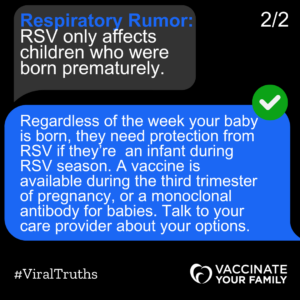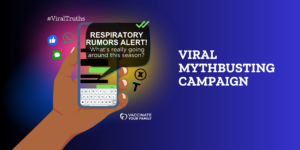ALL babies need protection from RSV – not just premature infants
 RSV can be serious for babies and children of ALL ages.
RSV can be serious for babies and children of ALL ages.
Respiratory Syncytial Virus – also known as RSV – is a common respiratory virus that causes cold-like symptoms similar to flu and COVID-19. It spreads during the respiratory disease season in the fall and winter, typically peaking in December and January. Even though RSV is common, that doesn’t mean it can’t be serious. According to the CDC, RSV is the leading cause of infant hospitalization in the U.S., causing an estimated 58,000-80,000 hospitalizations for children under 5 years old every year.
As RSV spreads every fall and winter, so do rumors about this respiratory virus. You may have heard the myth that RSV only affects premature infants, but it can affect babies and children of all ages. While it’s true that babies born prematurely are at a higher risk of serious illness from RSV, full-term babies, children of all ages, older adults, and people with weakened immune systems are hospitalized every year.
RSV can cause serious illness and complications
For babies, children, and adults who are high risk, RSV can cause serious complications. Severe illness such as pneumonia, which is an infection of the lungs, and bronchiolitis, which is inflammation of small airways in the lungs, can occur as a result of RSV infection. All babies under 3 months are high risk for developing bronchiolitis because their lungs and immune system are still developing, especially babies who are born prematurely. RSV is the most common cause of pneumonia and bronchiolitis in children younger than 1 year of age, including both premature and full-term infants.
RSV can hospitalize infants and children
 Symptoms of RSV in infants and young children might start off mild, but can quickly become serious. Up to 3 out of every 100 infants under 6 months are hospitalized with RSV each year. Babies and children who are hospitalized with RSV might require oxygen, IV fluids, and mechanical ventilation, which is a machine to help with breathing. Hospitalization can be a scary and stressful experience for both baby and parents, and can have longer-lasting impacts, such as infant weight loss, reduced breastmilk supply, and disruption to a breastfeeding schedule.
Symptoms of RSV in infants and young children might start off mild, but can quickly become serious. Up to 3 out of every 100 infants under 6 months are hospitalized with RSV each year. Babies and children who are hospitalized with RSV might require oxygen, IV fluids, and mechanical ventilation, which is a machine to help with breathing. Hospitalization can be a scary and stressful experience for both baby and parents, and can have longer-lasting impacts, such as infant weight loss, reduced breastmilk supply, and disruption to a breastfeeding schedule.
To read about one family’s experience when their baby was hospitalized with RSV, click here.
Prevent and protect through immunization
Since almost all children will be exposed to RSV by the time they are 2 years old, immunization is crucial for protecting your baby or young child. Luckily, we now have 2 options to protect babies against serious illness from RSV that are proven to be safe and effective.
Pregnant people can receive the maternal RSV vaccine to pass protection along to their baby. The vaccine is given at 32-36 weeks during RSV season to maximize an infant’s protection for 3 months following birth. Administration for this vaccine is seasonal, so it’s typically given to patients who are 32-26 weeks pregnant within the months of September-January. Data from clinical trials has proven that the maternal RSV vaccine reduces the risk of severe infant illness due to RSV by 82% in the first 3 months and 69% within 6 months after birth.
Another option to prevent RSV in infants and young children is a monoclonal antibody (mAb) treatment. Although it’s administered just like a vaccine, a mAb provides protection through different means. A mAb gives a person the antibodies they need to fight a specific disease, rather than teaching the body to make those antibodies the way a traditional vaccine does. This tool provides protection for up to a year and is recommended for infants up to 8 months of age during their first RSV season. The RSV mAb is also recommended for high risk children ages 8 to 19 months during their second RSV season. Data from clinical trials has proven that the RSV mAB is at least 80-90% effective in preventing babies from being hospitalized with RSV.
Pregnant people can choose between these 2 options with the help of a medical provider. According to the CDC, most babies only need one method of protection, not both.
What’s Really Going Around This Season?
Fall and winter bring a surge in respiratory viruses like flu, COVID, RSV, and the common cold—and with them, plenty of misinformation. Vaccinate Your Family (VYF) is here to help with our new Viral Mythbusting Campaign! Get the facts, debunk the myths, and stay informed. Check back weekly for new blog posts tackling the latest viral rumors and learn how to protect your family and community this season!
You can participate in our Viral Mythbusting Campaign by sharing the importance of busting respiratory disease myths on your social media platforms. VYF offers a free downloadable toolkit that follows an evidence-based format for combatting misinformation: lead with the fact, warn about the myth, explain how the myth misleads, and finish with the fact. Sometimes called a “truth sandwich,” this is a proven way to address respiratory rumors.
To join:
- Visit our campaign webpage
- Access our campaign toolkit
- Share any time during this respiratory disease season
- Use hashtag #ViralTruths and tag @vaccinateyourfamily on IG and FB, @vaxyourfam on X so we can amplify your posts!
To find drafted RSV myths social copy and downloadable graphics, click here.

Additional Resources
VYF provides up-to-date information on vaccine safety and access on our website. View our current programs to learn more about our services and ways to get involved.
For more information:
 RSV can be serious for babies and children of ALL ages.
RSV can be serious for babies and children of ALL ages.